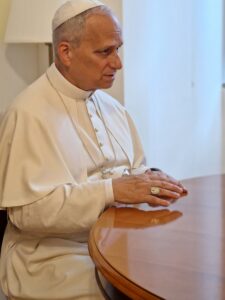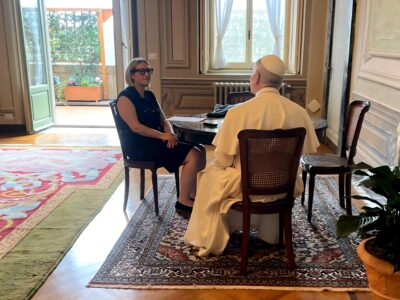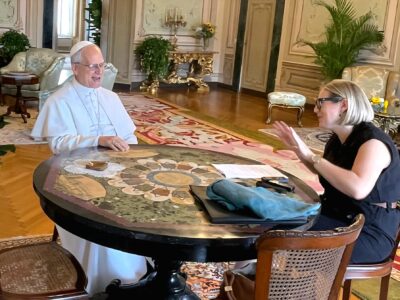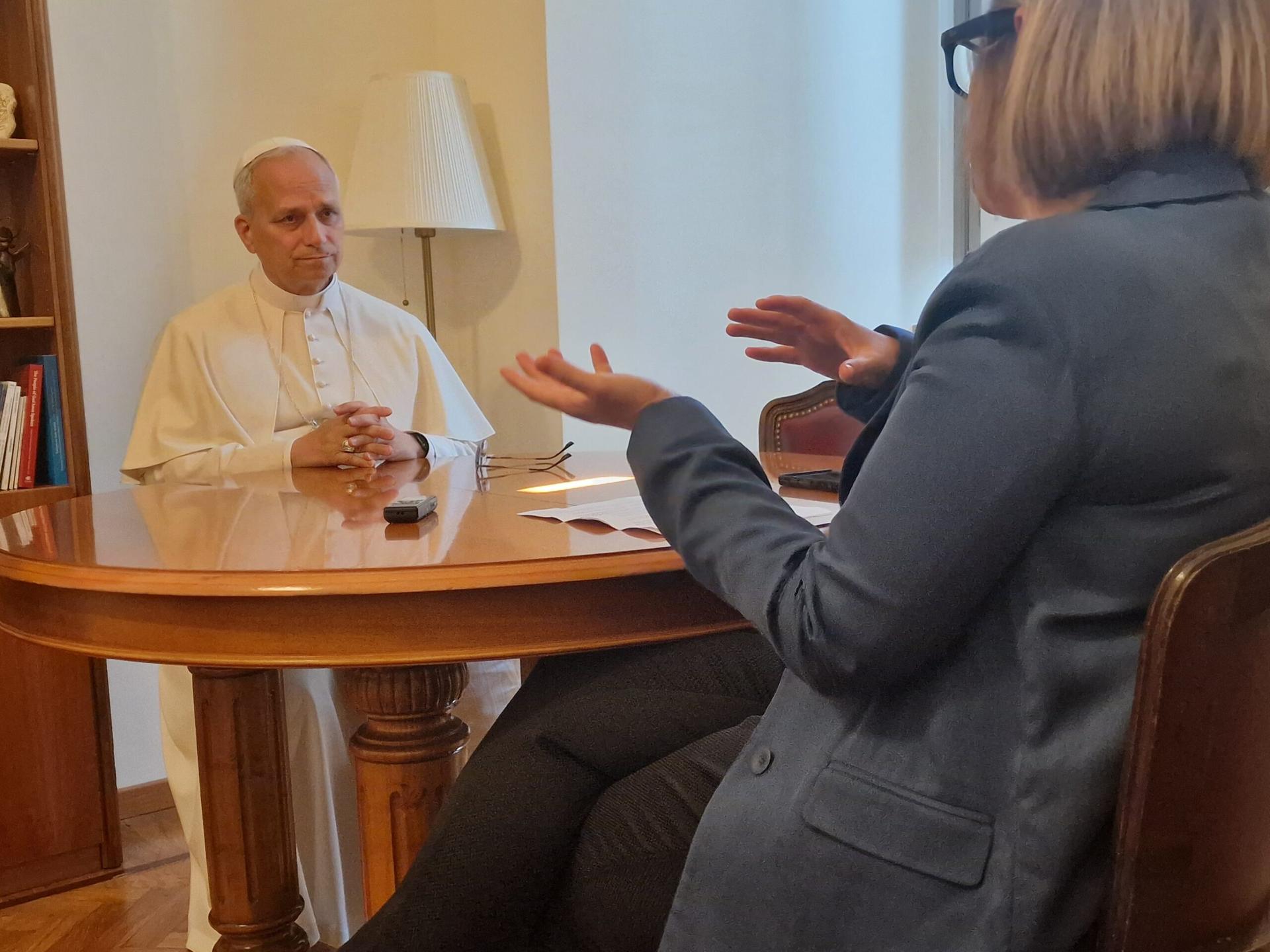By now most regular Crux readers, and much of the rest of the world, knows that Pope Leo XIV gave the first official interview of his papacy to me for my new biography of him, León XIV: Ciudadano del mundo, misionero del siglo XXI, or “Leo XIV: Citizen of the World, Missionary of the XXI Century,” which was published by Penguin Peru in Spanish Sept. 18.
It will be translated into French later this year, and will hit shelves in English, Portuguese and Italian at different junctures in 2026.
As part of this project, Pope Leo and I spoke in two separate conversations for a total of around three hours about his life, ministry, and leadership, as well as his vision for the future and his approach to issues of modern relevance, whether it be peace efforts in Ukraine and Gaza, or the role of women, the abuse crisis, or the inclusion of LGBTQ+ Catholics.
Since the book was published and excerpts of the final interview, contained in the last chapter, which offers a “look to the future,” came out, the two most consistent questions I have been asked in the slew of media interviews I’ve done are: “What was it like to interview the pope?” and “what are your main takeaways?”
Since those seem to be of keen interest across the board, to outlets and individuals across countries and languages (I’ve been asked those questions by English, Spanish and Italian language outlets), I thought our Crux readers might like to hear my thoughts on those things, too.

I’ll start with the first question: What was it like to interview the pope?
At a very basic level, interviewing the pope as a journalist is always simultaneously extremely exciting but also a bit nerve-wracking. Since this was Leo’s first official interview of his papacy and given his rather media-shy personality up until now, there was definitely added pressure.
However, I have to admit that there was also an ease about it that I attribute to our past history, but also his personality.
For those who followed our coverage of the conclave, they know that John L. Allen Jr. and I had each had contact with Robert Prevost well before his election to the papacy. I first met Bishop Robert Prevost in 2018 during a reporting trip to Peru, when he was bishop of Chiclayo and president of the national safeguarding commission, and John had crossed paths with him in the early 2000s, when then-Father Prevost was living in Rome as Prior General of the Augustinians.
We’d met him at his office once after he arrived in Rome as prefect of the Dicastery for Bishops and invited him to dinner, an invitation he graciously accepted in October 2024. When he was elected pope, the chair he sat in on our terrace was basically enshrined as a relic-by-contact.
So it was that when I was approached by Penguin Peru in May to write a biographical book about the new American/Peruvian pontiff, asking for his participation was natural, especially given our shared background as Americans with an experience and knowledge of both Peru and the Vatican.
When I went in for the first of our two interviews, which took place July 10 at the papal summer residence, the Villa Barberini, in Castel Gandolfo, it was the first time I’d seen Pope Leo privately since his election (John and I had a quick handshake during his May 12 audience with the press corps, but it was quite fast).

Naturally the question at the forefront of my mind was: Will he be different? Has the election, has this new office, changed him?
I didn’t know exactly what to expect, but when he walked in dressed in white and extended his hand to me with a warm smile and asking how I was, I had to choke back my emotion as I shook his hand and realized that absolutely nothing had changed. He was the same man he’d always been.
The Prevost I’d had occasion to interact with prior to his election was genuine, deeply sincere, honest and transparent, but also very clear about his ideas and, despite his calm demeanor, he was not shy or easily intimidated or overwhelmed.
That was the exact same person I encountered while interviewing Pope Leo XIV: from the very first moment, after the understandable nerves calmed for both of us, we settled into a deep and revealing conversation about himself and the most poignant aspects of his life and ministry.
Speaking to Leo did not feel stiff, formal or preconceived in any way: on the contrary, he was completely at ease, very comfortable with himself and with me, and he was thoughtful, reflective, and genuine in giving an answer to every question. He wanted to give direct and honest answers, but also reflective ones, and that told me a lot about him not only as a person, but as a pastor; indeed the pastor, now, of the universal church.
In terms of what my biggest takeaways are from the two separate conversations we had, I can say there are a few key things that stood out:
First, Leo is extremely cautious, not because he is afraid, but because he is weighing every single aspect of an issue very carefully and chooses his words selectively while trying to walk a delicate tightrope of being honest while also not adding to the polarization in society, and in the church.
In this sense, Leo struck me as being someone acutely intelligent and aware of the challenges in front of him, and he has a very clear vision already for what he wants to do, but is also aware of the need to build bridges and will make fostering unity a priority.
Second, many commentators since the interview has been published have already begun to speculate as to whether Leo will be a “second Pope Francis,” carrying forward the agenda of his predecessor, or whether he will shift tone and direction.
Some outlets critical of Prevost prior to the election, including InfoVaticana, have already run commentaries lamenting that Leo seems keen to carry many of Francis’s agenda items forward, while others have said he represents a change in direction, for better or worse.
My impression after speaking with Pope Leo and hearing his thoughts on most important matters in the world and in the church firsthand is that both of these interpretations hold truth: Pope Leo is committed to the overall direction of his predecessor, especially when it comes to social justice issues, targeting ideology and polarization, and promoting the synodal church.

However, Leo is not Francis, and he will do it in his own way. Francis, for one, could often be impulsive, and Leo is not, he will take his time and listen and reflect before making a decision.
Francis also notoriously distrusted his own system and worked around it, whereas Leo’s instinct will be to work with and through it, while also trying to continue the reforms he believes are needed.
In terms of tone, Francis was bold and direct and, because of that, was seen by many as divisive, whereas Leo is very clear about his intentions, but will be calmer and softer in his delivery. Francis also frequently made unilateral decisions, while Leo’s approach to decision-making is through collaboration and dialogue.
Leo has already said Pope Francis’s reforms of the Roman Curia in his 2022 constitution Predicate Evangelium provide a crucial framework, but he also said, without revealing any details, that he plans to modify a few things. He will also insist on the need to welcome LGBTQ+ individuals in the church and he will keep putting women in leadership, but where Francis was often ambiguous, Leo is more willing to articulate where he draws the line, even if their approach is more or less the same.
Another takeaway from my conversations is that Pope Leo can be transformative on the issues of Vatican finances and the clerical sexual abuse crisis.
As someone who has spent nearly his whole priesthood in leadership and administration of some kind, he is used to managing a budget and has extensive experience doing just that in a variety of projects and entities along the way, whether it is charitable donations for Caritas, raising money to rebuild a church, or managing his diocese and religious order.
With the wealth of administrative experience that he has, if Leo says, as he did to me, that he is not concerned about the Vatican’s finances or its practically non-existent pension fund, I am inclined to give him the benefit of the doubt. He seemed to already have several ideas in place, and I am looking forward with great interest to seeing what he does.
Pope Leo is also someone who is very experienced when it comes to dealing with clerical abuse cases. He dealt with these cases while serving as a judge in the ecclesial tribunal of Trujillo as a missionary, and he also dealt with the issue extensively while managing his Augustinian order and as bishop of Chiclayo, a period when he also served as president of the national safeguarding commission.
Leo has listened to and met with victims over the years, and he played a key role in the local investigation into the Sodalitium Christianae Vitae (SCV) in Peru, a lay community suppressed by Pope Francis shortly before his death.
Based on my personal experience and the testimonies that I’ve heard as part of the book-writing process, Leo is keenly aware of the various aspects of the clerical abuse crisis and the challenges that come with it, from the importance of welcoming and listening to victims, to ensuring a due process and also that justice be as swift as possible.
Given his extensive background on this issue, he is uniquely positioned to take the church to another level when it comes to safeguarding efforts, and also streamlining the judicial process.
Finally, my last takeaway is that while the “honeymoon” phase of Leo’s papacy won’t last forever, especially as he begins to make more serious decisions and appointments, the sense of calm and balance he has brought so far has been refreshing.
He is someone who very much wants to take the temperature down, and while understanding that that is not going to be possible entirely, his commitment to building bridges, and to fostering unity and communion in a time a polarization, is clear, and I think will be a hallmark of his papacy. This was obvious from his own demeanor, but also the tone of his answers and the language he chose.
All in all, I think Pope Leo is a very fascinating man with a lot brewing beneath the surface, and I think that despite the calmness he has brought so far, he will certainly surprise us.
Follow Elise Ann Allen on X: @eliseannallen










